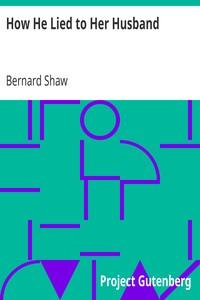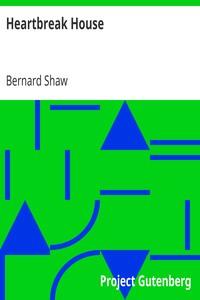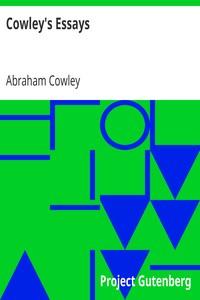Read this ebook for free! No credit card needed, absolutely nothing to pay.
Words: 35485 in 9 pages
This is an ebook sharing website. You can read the uploaded ebooks for free here. No credit cards needed, nothing to pay. If you want to own a digital copy of the ebook, or want to read offline with your favorite ebook-reader, then you can choose to buy and download the ebook.
Please do not remove this.
Edition: 10
COWLEY'S ESSAYS
by Abraham Cowley
Contents: Introduction Of Liberty Martial. Lib. 2. Vota tui breviter, etc. Martial. Lib. 2. Vis fieri Liber, etc. Martial. Lib. 2. Quod to nomine? etc. Ode Upon Liberty. Of Solitude. Hail, old patrician trees, so great and good! Of Obscurity. Seneca, ex Thyeste, Act 2. Chor. Of Agriculture. Virg. Georg.--O fortunatus nimium, etc. Horat. Epodon. Beatus ille qui procul, etc. The Country Mouse Horace To Fuscus Aristius. The Country Life The Garden Happy art thou whom God does bless Of Greatness. Horace. Lib. 3. Ode 1. Odi profanum vulgus, etc. Of Avarice. I admire, Maecenas, how it comes to pass, "Inclusam Danaen turris ahenea." The Dangers of an Honest Man in much Company. Claudian's Old Man of Verona. The Shortness of Life and Uncertainty of Riches. Why dost thou heap up wealth, which thou must quit, The Danger Of Procrastination. Mart. Lib. 5, Ep. 59. Mart. Lib. 2, Ep. 90. Of Myself. Martial, Lib. 10, Ep. 47. Martial, Lib. 10. Ep. 96. Epitaphium Vivi Auctoiris. Epitaph Of The Living Author. A Few Notes.
INTRODUCTION.
Abraham Cowley was the son of Thomas Cowley, stationer, and citizen of London in the parish of St. Michael le Querne, Cheapside. Thomas Cowley signed his will on the 24th of July, 1618, and it was proved on the 11th of the next month by his widow, Thomasine. He left six children, Peter, Audrey, John, William, Katherine, and Thomas, with a child unborn for whom the will made equal provision with the rest. The seventh child, born before the end of the same year, was named Abraham, and lived to take high place among the English Poets.
The calm spirit of Cowley's "Essays" was in all his life. As he tells us in his Essay "On Myself," even when he was a very young boy at school, instead of running about on holidays and playing with his fellows, he was wont to steal from them and walk into the fields, either alone with a book or with some one companion, if he could find any of the same temper. He wrote verse when very young, and says, "I believe I can tell the particular little chance that filled my head first with such chimes of verse as have never since left ringing there; for I remember when I began to read and to take some pleasure in it, there was wont to lie in my mother's parlour , but there was wont to lie Spenser's works." The delight in Spenser wakened all the music in him, and in 1628, in his tenth year, he wrote a "Tragical Historie of Pyramus and Thisbe."
In his twelfth year Cowley wrote another piece, also in sixteen stanzas, with songs interspersed, which was placed first in the little volume of Poetical Blossoms, by A. C., published in 1633. It was a little quarto of thirty-two leaves, with a portrait of the author, taken at the age of thirteen. This pamphlet, dedicated to the Dean of Westminster, and with introductory verses by Cowley and two of his schoolfellows, contained "Constantia and Philetus," with the "Pyramus and Thisbe," written earlier, and three pieces written later, namely, two Elegies and "A Dream of Elysium." The inscription round the portrait describes Cowley as a King's Scholar of Westminster School; and "Pyramus and Thisbe" has a special dedication to the Head Master, Lambert Osbalston. As schoolboy, Cowley tells us that he read the Latin authors, but could not be made to learn grammar rules by rote. He was a candidate at his school in 1636 for a scholarship at Cambridge, but was not elected. In that year, however, he went to Cambridge and obtained a scholarship at Trinity.
"Take them, and me, in them acknowledging How much my Summer waits upon thy Spring."
Cowley was able afterwards to help Crashaw materially, and wrote some lines upon his early death.
In 1639 Cowley took the degree of B.A. In 1640 he was chosen a Minor Fellow, and in 1642 a Major Fellow, of Trinity, and he proceeded to his M.A. in due course. In March, 1641, when Prince Charles visited Cambridge, a comedy called "The Guardian," hastily written by Cowley, was acted at Trinity College for the Prince's entertainment. Cowley is said also to have written during three years at Cambridge the greater part of his heroic poem on the history of David, the "Davideis." One of the occasional poems written at this time by Cowley was on the early and sudden death of his most intimate friend at the University, William Hervey, to whom he was dearer than all but his brothers and sisters, and, says Cowley:
Free books android app tbrJar TBR JAR Read Free books online gutenberg
More posts by @FreeBooks

: How He Lied to Her Husband by Shaw Bernard - English drama (Comedy); Marriage Drama; Triangles (Interpersonal relations) Drama; London (England) Drama One Act Plays


: Heartbreak House by Shaw Bernard - World War 1914-1918 Drama; Upper class England Drama; England Social life and customs 20th century Drama


: La Mere Bauche From Tales of All Countries by Trollope Anthony - Short stories; Mate selection Fiction; France Fiction






